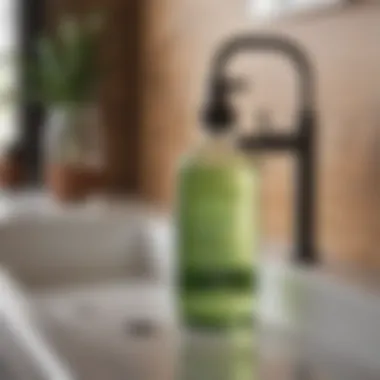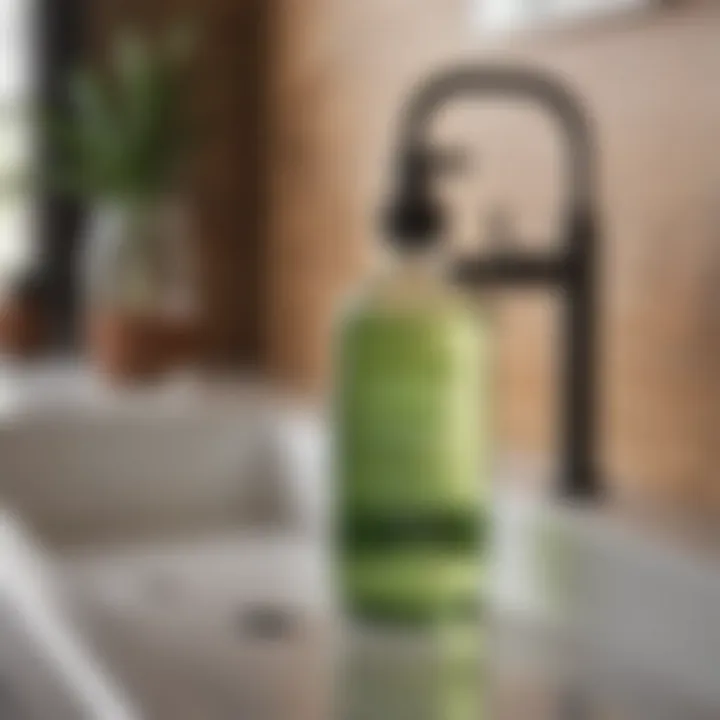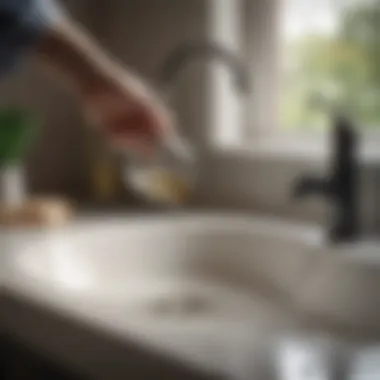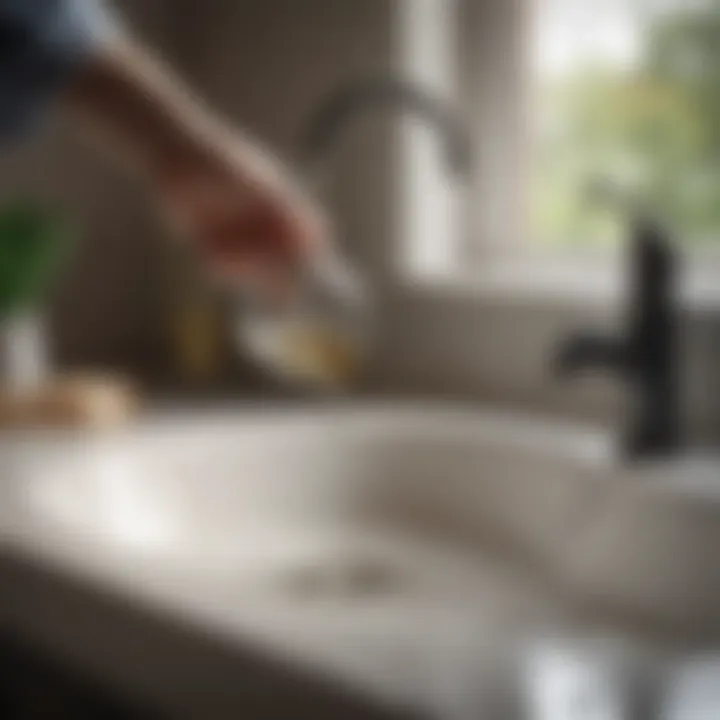Unclogging Bathroom Sinks with Vinegar: A Natural Solution


Intro
Clogged bathroom sinks are a common annoyance in many households. Often, traditional solutions may not yield satisfactory results. However, vinegar has emerged as a simple yet effective alternative for clearing such stubborn blockages. It offers a natural, non-toxic way to address clogs while promoting eco-friendly home maintenance practices. Understanding how vinegar can help unclog your sink is essential for anyone looking to manage their household effectively.
Benefits of Using Vinegar
Vinegar serves multiple purposes in the home, particularly in unclogging sinks. Here are some key benefits:
- Eco-friendly: Vinegar is a non-toxic substance that does not harm the environment.
- Cost-effective: Compared to chemical drain cleaners, vinegar is much cheaper and more accessible.
- Simple application: It is easy to use and requires no specialized tools.
- Prevents future clogs: Regular use can help reduce buildup in pipes.
How Vinegar Works
Vinegar primarily consists of acetic acid, which gives it its strong cleaning properties. When combined with baking soda, a chemical reaction occurs, producing carbon dioxide and helping to dislodge debris in pipes. This reaction can effectively clear minor to moderate clogs.
Preparation for Use
Before using vinegar for unclogging, proper preparation is necessary:
- Gather materials: You will need white vinegar, baking soda, and hot water.
- Clear the area: Remove any non-essential items from under the sink to work safely.
- Assess the clog: Determine the severity of the blockage to decide if vinegar is a suitable solution.
Application Techniques
The application of vinegar in unclogging a bathroom sink involves the following steps:
- Pour baking soda: Start by pouring about half a cup of baking soda directly into the drain.
- Add vinegar: Follow with half a cup of vinegar. You will notice fizzing as a reaction occurs.
- Let it sit: Allow the mixture to sit for at least 30 minutes, giving it time to work.
- Flush with hot water: After the waiting period, flush the drain with hot water to clear any remaining debris.
"Regular maintenance using vinegar can help prevent the inconvenience of clogged drains."
Additional Tips for Prevention
To further reduce the likelihood of clogs in your bathroom sink, consider these preventive measures:
- Avoid flushing unsuitable items: Do not dispose of hair or grease through the sink.
- Use sink strainers: They can help catch debris before it enters the drain.
- Routine cleaners: Use vinegar periodically as a preventive cleaning agent.
Safety Considerations
While vinegar is generally safe, some precautions are wise to keep in mind:
- Avoid mixing with other chemicals: Combining vinegar with bleach or ammonia can create toxic fumes.
- Proper ventilation: Ensure good air flow in case of stronger odors.
The End
Understanding how to use vinegar effectively for unclogging bathroom sinks is beneficial for homeowners. Not only does it provide an eco-friendly alternative to harsh chemicals, but it also offers a simple solution that can help maintain plumbing systems efficiently. By following the steps and tips outlined, you can manage clogs with greater confidence and ease.
Prologue to Sink Clogs
Understanding sink clogs is essential for any homeowner. They can lead to unpleasant odors, slow drainage, and, in severe cases, complete blockage. This article aims to highlight the causes and effects of clogs, especially focusing on bathroom sinks. It is vital to address clogs immediately, as they can escalate into more significant plumbing issues. Knowing about typical clogging agents can assist in avoiding future problems.
Common Causes of Bathroom Sink Clogs
Bathroom sink clogs can arise from various sources. Here are some of the most common culprits:
- Hair: Strands of hair accumulate over time, creating a tangled mass that obstructs water flow.
- Soap Scum: Residue from soap mixes with mineral buildup, leading to a sticky paste that can block pipes.
- Toothpaste and Hygiene Products: These substances can cause a thick sludge when mixed with water, contributing to clogs.
- Foreign Objects: Items like small toys or cotton swabs can accidentally drop into the sink, leading to blockages.
Identifying these causes is crucial for prevention. Regular cleaning and being mindful of what goes down the drain can mitigate these issues.
Understanding the Impact of Clogs
The impact of sink clogs extends beyond mere inconvenience. Even minor clogs can disrupt daily routines. Over time, clogs can deteriorate pipes and increase the risk of leaks. This not only incurs repair costs but can also lead to water damage in your home.
Additionally, slow drainage can create a breeding ground for bacteria and mold. This poses health risks, especially in damp environments. Depending on the severity, an unresolved clog can lead to complete blockages, forcing homeowners to seek professional plumbing services, and often, incurring substantial costs.
Understanding the nature of sink clogs allows homeowners to adopt proactive measures. It encourages maintenance and awareness, ultimately fostering a healthier living environment.


The Role of Vinegar in Clog Removal
Vinegar is recognized for its many household uses, and unclogging bathroom sinks is one prominent application. The benefits of vinegar in this context extend beyond mere practicality. It is an eco-friendly and low-cost solution that can often resolve stubborn blockages without the need for harsh chemicals.
Understanding the role of vinegar can empower homeowners with knowledge and skills to handle plumbing issues. By utilizing this natural agent, individuals contribute to a healthier environment while effectively maintaining their homes. Vinegar's effectiveness in breaking down grime, grease, and other materials that typically cause clogs merits detailed exploration.
Chemical Properties of Vinegar
Vinegar primarily consists of acetic acid and water. The acetic acid concentration typically found in household vinegar is about 5%. This acidity is what gives vinegar its cleaning power. The acidic nature allows it to dissolve mineral deposits and organic substances, making it an effective agent when dealing with clogs.
When it comes into contact with grease, it can emulsify oils, breaking them down into smaller particles. Moreover, vinegar's antibacterial properties can help reduce buildup of bacteria that often flourish in drains. For these reasons, vinegar is a suitable choice for individuals seeking a more natural approach to drain cleaning.
Comparative Effectiveness of Vinegar vs. Commercial Solutions
Commercial clog removers often boast strong chemical formulations. While these might sometimes offer immediate results, they can carry significant drawbacks. Products like Drano or Liquid Plumr typically contain caustic substances that can corrode pipes over time, particularly older plumbing systems.
In contrast, vinegar presents a safer alternative.
- Effectiveness: In many cases, vinegar can dislodge stubborn clogs caused by hair and soap scum as effectively as some commercial solutions.
- Environmental Safety: Vinegar is biodegradable and poses no threat to human health or the environment, unlike toxic chemicals found in many commercial products.
- Cost Efficiency: Given its low price, utilizing vinegar can be more economical in the long run, as it requires no special handling or disposal methods.
While vinegar may not clear every type of clog as quickly as commercial agents, its overall advantages make it a valuable tool in unclogging bathroom sinks.
Using vinegar as a natural cleaning solution not only promotes health and safety but also aligns with sustainable practices in home maintenance.
Preparing for the Clog Removal Process
Preparing for the clog removal process is an essential step in effectively unclogging a bathroom sink using vinegar. This stage involves gathering the necessary materials and being aware of safety precautions. Proper preparation not only facilitates a smoother unclogging experience but also minimizes the risks associated with handling cleaning agents.
By understanding the steps to prepare, homeowners can approach the task with confidence and assurance. Each element in this process contributes to a successful outcome, ensuring that both vinegar’s properties and your own safety are prioritized, leading to more effective results.
Necessary Materials
To utilize vinegar for unclogging, it is imperative to assemble the following materials:
- White vinegar: The main ingredient that helps dissolve clogs.
- Baking soda: A complementary ingredient that enhances vinegar’s effectiveness.
- Hot water: Used to flush away the debris after vinegar application.
- A container or cup: To measure and pour the vinegar and baking soda mixture.
- A plunger: In case manual assistance is needed to dislodge stubborn clogs.
Each of these materials plays a vital role in ensuring the unclogging process is thorough and efficient. White vinegar, for instance, is known for its acidic properties, which break down the greasy build-up often found in bathroom sinks. Baking soda can react with vinegar to create a fizzing effect, further aiding in the disintegration of the blockage.
Safety Precautions
Safety should always be a primary consideration when using any cleaning method. Here are essential safety precautions to adhere to:
- Wear gloves: Protect your hands from the acidic nature of vinegar.
- Ventilation: Ensure the area is well-ventilated. Open windows or use a fan to disperse any strong odors.
- Avoid mixing chemicals: Never combine vinegar with bleach or other chemicals. This can create hazardous fumes that are harmful to health.
- Inspect the sink: Before starting, check for any visible signs of damage or wear in the plumbing. This can prevent further complications during the process.
By following these safety measures, one can minimize potential risks while handling vinegar and other materials. Careful preparation is an investment in ensuring the unclogging procedure is as safe and effective as possible.
Step-by-Step Guide to Unclogging with Vinegar
Addressing bathroom sink clogs can seem overwhelming. However, with a structured approach, it is very manageable. This section outlines a clear method using vinegar. Understanding the step-by-step process is crucial because it provides clarity and reduces frustration. It ensures that the correct measures are taken, minimizing damage to pipes and promoting efficient unclogging. Vinegar is not just an ingredient; it's a reliable ally in maintaining a clean and functional bathroom sink.
Initial Assessment of the Clog
Before applying vinegar, assessing the clog's severity is important.
- Identify the Symptoms: Look for slow drainage, gurgling noises, or a foul odor. These are signs of a buildup.
- Check for Visible Blockages: Sometimes, hair or solids can be seen in the drain. If visible, these can often be removed manually.
- Determine the Cause: Understanding whether the clog is due to hair, soap, or accumulated grime can help gauge the blockage's location in the pipes. Identifying the blockage can lead to a more targeted approach.
Taking time at this step can determine the effectiveness of the following methods.
Application of Vinegar
Once the assessment is done, applying vinegar is the next logical step.
- Measure the Vinegar: Use about one cup of distilled white vinegar for standard clogs. This amount is often sufficient to dissolve minor blockages.
- Pouring Technique: Pour the measured vinegar directly into the sink. Allow it to sit there for at least 30 minutes. This waiting period is crucial as it lets the vinegar act on the clog effectively.
- Follow-Up Action: After waiting, flush with hot water. This helps in clearing any remaining residues. If the clog persists, a repeat application may be necessary.
Recommendations for Complementary Ingredients


Using complementary ingredients can enhance the effectiveness of vinegar in unclogging sinks.
Baking Soda
Baking soda plays a vital role when combined with vinegar. It acts as a mild abrasive and also neutralizes odors. The unique effervescence created when baking soda meets vinegar helps break down grime and debris. Here are its key features:
- Effizzing Effect: When vinegar is added to baking soda, a chemical reaction occurs. The fizz helps to dislodge clogs effectively.
- Versatile Cleaner: Beyond unclogging, baking soda is a great natural cleaner, which adds to its appeal as a household staple. Its natural properties make it safe for pipes.
While it is a highly effective ingredient, one should be aware it may not dissolve grease as effectively as hot water might.
Hot Water
Hot water also has a significant role in the unclogging process. Its heat can aid in breaking down grease or soap buildup. Here are its key aspects:
- Grease Dissolution: Hot water loosens greasy deposits and helps to clear out the pipes. It is especially useful if the clog is greasy rather than solid.
- High Temperature: Using boiled water ensures maximum effectiveness when applied after leaving vinegar in the sink.
One must be cautious with very hot water, as it can risk damaging older pipes made from certain materials.
Final Steps for Clearing the Drain
After using vinegar, follow up with these steps for clearing the drain completely:
- Rinse Effectively: After the vinegar and complementary ingredients have been in the sink, it is time to rinse thoroughly with water, preferably hot. This removes all remnants and also encourages the final stages of dislodging.
- Repeat if Necessary: If the clog persists, it may require multiple applications. Being patient is key during this process.
- Check the Flow: Once cleared, run the tap to ensure water flows freely and without any obstructions.
Post-Unclogging Maintenance
Post-unclogging maintenance is a crucial component of ensuring the long-term functionality of your bathroom sink. Once the immediate issue of a clog has been addressed, the goal shifts to preventing recurrence. Regular maintenance can help to eliminate future blockages, prolong the life of your plumbing, and foster a cleaner, more hygienic environment.
The Importance of Regular Cleaning: After successfully removing a clog with vinegar, it is advisable to clean your sink on a regular basis. This can involve basic practices like running hot water or using a mixture of vinegar and baking soda for routine upkeep. Such regular cleaning of the sink also removes soap residue, hair, and other debris that may accumulate, thus reducing the risk of new clogs.
Benefits of Maintenance: Implementing a maintenance routine has several benefits. First, it often saves time and effort, reducing the need for emergency unclogging. Second, small issues can be addressed before they escalate into major problems that require professional help. Moreover, maintaining a clean sink can improve overall hygiene by minimizing the growth of bacteria and mold.
Regular Maintenance Practices
Routine Cleaning: Simple tasks like rinsing the sink with warm water every few days can be effective. This helps to clear away any minor debris. A more thorough cleaning using vinegar every month can provide additional protection against clogs. This vinegar treatment can break down build-up within pipes and ensure that your plumbing remains largely unobstructed.
Avoiding Harmful Products: It is wise to avoid flushing harsh chemicals down the drain. These can inadvertently react with each other or even damage your plumbing system. Instead, opt for natural solutions that align with eco-friendly practices.
Adhering to a Schedule: Developing a cleaning schedule will contribute to better maintenance. Consider setting aside time on a specific day each month to conduct cleaning and inspections. This will keep your sink in optimal condition.
Signs of Future Clogs
Slow Draining: One of the first signs that a clog could be developing is slow drainage. Water taking longer than usual to go down the drain can indicate a buildup in the pipes.
Unpleasant Odors: Foul smells emanating from the sink are a clear signal that decaying matter could be trapped within the pipes. Ignoring this issue may lead to more severe blockages down the line.
Gurgling Sounds: Gurgling noises when draining water can indicate air trapped in the plumbing due to a build-up. This sound should not be dismissed, as it can point toward an imminent clog.
Visible Deposits: If you observe visible substances or film accumulating around the drain areas, it could signal that a clog is forming beneath the surface. Regular inspection can help you catch these warning signs early.
Environmental Impact of Cleaning Solutions
Addressing the environmental impact of cleaning solutions is essential, especially in a time when eco-friendliness is more than just a trend. Many people are unaware of the harmful effects that conventional cleaning agents can have on both the environment and their household ecosystems. This section focuses on the advantages of natural alternatives like vinegar, emphasizing the benefits not only to users but also to the broader environment.
Advantages of Natural Cleaning Alternatives
Natural cleaning alternatives are gaining traction for a variety of reasons:
- Non-toxic: Vinegar, along with other natural agents, does not include harsh chemicals. This makes it a much safer option for families, especially those with children or pets.
- Biodegradability: These products break down easily in nature. Unlike synthetic cleaners, which can linger in the environment and harm wildlife, natural solutions contribute less to pollution and environmental degradation.
- Cost-effective: Common pantry items like vinegar and baking soda serve as effective cleaning agents, reducing the need to purchase expensive commercial products.
- Multifunctionality: Many natural cleaners can tackle a range of issues beyond unclogging sinks, like surface cleaning and odor elimination. This broadens their use in household maintenance.
Using vinegar offers a practical, accessible approach while simultaneously being gentle on the planet.
Sustainability Considerations


Sustainability encompasses not only how a product is made but also how it affects the planet post-use. When it comes to cleaning solutions, choosing sustainable options has a ripple effect on the environment:
- Reduced Carbon Footprint: Local and digestible sources of cleaning agents, like vinegar, lower transportation emissions. This is crucial as consumers become more aware of their carbon footprints.
- Sourcing of Ingredients: Many natural cleaners utilize abundantly available materials, reducing reliance on harmful production processes. This factor is vital for diminishing industrial pollution.
- Impact on Water Supply: Harsh chemicals can contaminate water sources. Utilizing vinegar and similar solutions helps to mitigate risk to local waterways and ecosystems.
Investing in natural alternatives aligns with a greater movement toward environmental stewardship. When choices are made with sustainability in mind, there is a significant cumulative benefit.
"The best way to find yourself is to lose yourself in the service of others." – Mahatma Gandhi
In summary, the environmental impact of cleaning solutions cannot be overlooked. Natural alternatives like vinegar not only serve the immediate purpose of unclogging but also provide extensive ecological benefits. Embracing such products encourages a shift towards more sustainable living practices.
Alternatives to Vinegar for Clog Removal
Exploring alternatives to vinegar for unclogging bathroom sinks is important for homeowners who may seek different options or who have sensitivities to vinegar's strong odor. While vinegar is a natural solution, understanding various methods allows for flexibility and ensures effective drain cleaning.
Other Natural Cleaning Agents
Several natural cleaning agents can provide alternatives to vinegar for unclogging. These agents offer similar benefits and can be used based on personal preferences or specific clog types. Here are a few notable ones:
- Baking Soda: A common household item, baking soda is alkaline and reacts well with acids like vinegar. Its gentle abrasiveness can help dislodge debris when used in combination with other agents.
- Lemon Juice: Known for its acidity, lemon juice can effectively break down grease and grime. Its pleasant scent also makes it a favorable option compared to vinegar.
- Salt: When used with hot water, salt can help dissolve minor clogs. It works especially well on organic matter.
- Borax: This mineral is effective at breaking down tough clogs and kills mold and fungi. For those looking for a stronger alternative, borax is a viable option.
When trying these alternatives, it is crucial to follow a similar procedure to vinegar. Start with an initial assessment of the clog, apply the chosen agent, and follow up with hot water to clear the drain.
When to Seek Professional Help
Certain situations may warrant the involvement of professional plumbers. Identifying these can prevent damage to pipes and save time. Consider seeking help from professionals in the following cases:
- Persistent Clogs: If a drain remains clogged after multiple attempts with home remedies, it may indicate a more significant issue.
- Recurring Problems: Frequent clogs may suggest deeper systemic issues within the plumbing.
- Complete Blockages: If draining stops entirely, it is often wise to consult a plumber rather than risk damage by continued attempts at DIY solutions.
- Uncertainty: If unsure about the methods to use, professional guidance can prevent accidents or unforeseen complications in the plumbing system.
Addressing Concerns Around Using Vinegar
Understanding the potential issues with using vinegar in unclogging bathroom sinks is crucial for homeowners. While vinegar is a popular and eco-friendly solution, it’s necessary to recognize its limitations and any possible risks associated with its use. By being aware of these factors, individuals can make informed decisions about their methods for tackling clogs.
Potential Risks and Limitations
Vinegar has natural acidity that can help break down certain blockages, but it also has some risks. One major limitation is that vinegar might not work on every type of clog. For instance, if a blockage is caused by a solid object or extensive buildup, vinegar alone may not suffice. Additionally, while vinegar can dissolve some mineral deposits, heavy or complex clogs might need more aggressive measures.
Another point of concern is the impact of repeated vinegar usage on plumbing. Using vinegar regularly, especially in large quantities, may contribute to wear on certain types of pipes. Older plumbing systems made of materials like galvanized steel are particularly vulnerable. Homeowners should consider their plumbing's age and material before relying too heavily on vinegar.
"Vinegar can be a great tool for some clogs, but reliance on it for every problem could lead to other issues in your plumbing system."
Reaction with Other Chemicals
One of the key considerations when using vinegar as a cleaning agent is its potential reactions with other chemicals. Mixing vinegar with bleach is dangerous and should absolutely be avoided. The combination produces toxic chlorine gas, which can lead to suffocation and serious health risks.
In addition, vinegar may not react favorably with other common cleaning agents. For example, when combined with baking soda, it can create an energetic fizzing reaction that some may think enhances its cleaning effectiveness. While this reaction can help lift debris, the results may not be as significant as hoped. Over time, repeated mixing with various substances can lead to unpredictable reactions. It is always best to use these agents separately, allowing one to act before applying another.
In summary, while vinegar is a practical and sustainable solution for unclogging sinks, it is vital to address its limitations. Homeowners need to understand their plumbing systems and the risks associated with combining cleaning materials. This understanding will ensure they can tackle clogs effectively while minimizing potential damage.
Summary and Endings
In this article, we explored the efficacy of vinegar as a solution for unclogging bathroom sinks. This section highlights the importance of understanding both the unclogging process and the environmental benefits that accompany the use of natural agents like vinegar. Many people underestimate the power of household items, relying instead on harsh chemicals that can harm both plumbing and the environment. Recognizing how vinegar can be both effective and eco-friendly is crucial in promoting sustainable home maintenance practices.
Recap of the Unclogging Process
The unclogging process using vinegar is straightforward and can be an effective method in many cases. First, it is essential to assess the severity of the clog. If the water drains slowly but does not completely back up, this may indicate a moderate clog. In such cases, pouring vinegar directly down the drain can help dissolve the buildup.
In addition to vinegar, complementary ingredients like baking soda can aid in enhancing the unclogging effect. For instance, here’s a simple step-by-step recap:
- Initial Assessment: Check the severity of the clog. Look for standing water and the speed of drainage.
- Application of Baking Soda: Pour baking soda down the drain first. This helps to break down grease and debris.
- Using Vinegar: Follow with vinegar, which reacts with baking soda to produce bubbles that push the clog through.
- Rinsing: After waiting a few minutes, flush the drain with hot water to clear any remaining residue.
This method emphasizes that by following a systematic approach, homeowners can efficiently handle many clogs without needing professional intervention.
Encouraging Sustainable Practices
Encouraging sustainable practices in home maintenance involves making informed choices that consider both effectiveness and environmental impact. Vinegar is a prime example of such a choice. Unlike commercial drain cleaners that may contain harmful chemicals, vinegar is both biodegradable and less toxic. Thus, using vinegar aligns with a growing awareness around eco-friendly lifestyles.
To promote these sustainable habits, homeowners should:
- Educate themselves about the benefits of natural cleaning agents. Consider reading resources on platforms like Wikipedia, which provide valuable information on the science behind vinegar.
- Share experiences on social media, such as forums on Reddit, to help spread knowledge about effective home remedies.
- Regularly maintain their plumbing systems to reduce the need for drastic measures.
By integrating these practices into regular home maintenance, individuals contribute positively to environmental sustainability while enjoying a practical approach to managing common plumbing issues.







